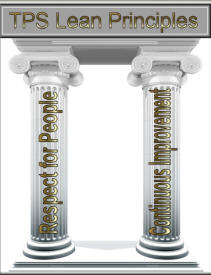TPS Lean Principles
- Home >
- articles >
- maintenance-management >
- tps lean principles
TPS Lean Principle of Respect
By Patrick Ross
Respect for People: Who They Are or What They Do?

The two pillars of TPS (Toyota Production System) - Lean principles are respect for people and continuous improvement.
Many organizations will at some point ask themselves "how do we get more from our people?" Sometimes it's because of the deep frustration that there is no ownership, no initiative or no suggestions for improvement. Sometimes it's because most associates are doing the absolute minimum to fulfill their contract. And sometimes it's because the organization has embarked on a transformation (Lean, Operational Excellence, etc.) part of which requires getting more out of people.
The Toyota Production System has a strong emphasis on "Respect for People" or "Respect for Humans" and this is very often endorsed by organizations embarking on a Lean/TPS program.
But the question is "What does Respect for People really mean?"
I have never read any Mission Statement, any Corporate Vision, or Corporate Values that have stated: We value our associates and respect them as people: we provide drinking water, regularly cleaned bathrooms, a salary and we do not use whips. Because of this, we expect our associates to do exactly what we tell them to do, speak only when asked, express opinions that are only in 100% alignment with their leaders and be creative in making suggestions when requested. We value those that support these values: they're not the ones always complaining about everything. Our duty to them is to remove those that feel it their 'right to be negative'.
Yet, in spite of the goodwill of their leadership team, many corporate cultures will often reflect some, or most, of these cynical statements. I have experienced cases where very good leaders, acting with genuinely good intent, somehow end up with almost the exact opposite of the culture they set out to achieve and don't even know it! Many of these leaders are regularly talking to their associates at their workplace, always asking for suggestions, always having an open door, rewarding good ideas, etc. They have lots and lots of energy to always keep motivating their associates because they know that if they stop, or do it less often, their associates will lose motivation and interest. They genuinely believe that it is what good Leadership is all about!
At times, some of these leaders ask themselves "why does it have to be so hard?" They struggle, like I did, to truly understand. At some point we conclude that we are leaders to serve our associates. So we unwittingly look down on those lost sheep: they don't really know, they easily get confused, they need us to motivate them, etc. I know this only too well, having re-energized so many times with these thoughts. But then one day, I realized that I was 'the problem'!
I always felt that in my Leadership, I genuinely respected people. I was polite, considerate, even at times compassionate, and always politically correct. Sure, I had my bad moments, but had truthfully apologized for most of them. Most of all I believed that I treated people as I would like to be treated. And that was my error.
There was a turning point. It came during an episode of the TV sitcom Everybody Loves Raymond, when Debra says "Ray, don't tell me how to feel" There it was, The Truth: people are individuals who feel how they feel, not how I feel, or how I assume they should feel! Treating them like I wanted to be treated was effectively saying that the whole world should be like me: this was absolutely not "respecting people".
The next part of the journey was the realization that people are not what they do, but who they are, and most of all, who they want to become. Most organizations respect their associates: it is about what they do. And what happens is that people come to work, but associates go to their workplace. So although we call associates "our people", we have in reality de-humanized them: they are here for what they do, not for who they are. In fact, who they are is often very, very inconvenient, to the point where who they are is the root cause of all our problems.
Who people are, and what they contribute to the organization by being who they are, was driven home by one example (I have changed some details to respect the privacy of those involved).
M was a single mum of 4, who lived on the other side of town. She would have to get up at 4:30 so she could be at work by 7:00. She always was. It did not seem to matter that M had to get 4 kids ready for childcare and school, she managed and was there. And she did her job very well. But M was never one to make suggestions, she never had anything much to say in team meetings, she never volunteered for any quality circles, she kept herself away from others at break time. M was not the ideal profile of the associate we wanted to have in our Lean journey. But one day, some of her workmates who drove together to work witnessed a fatal accident involving a young child: they were traumatized, and all their other colleagues were upset. As we struggled with HR to find a suitable counselor to be there by the end of the day, M went to sit next to them. A few minutes later, M was hugging her colleagues. They returned to work shortly after, and there seemed to be far less emotional stress in the area. When the counselor finally arrived, he congratulated us for handling the situation so well: we told him that M did something. When M was asked what she did, she quietly said "I lost my husband in a car accident on his way to work 3 years ago! "- she didn't say much more. What this taught me was that M was had done far more for our organization than the 2 suggestions a month we had expected of her.
It would be too easy for all the leaders out there, who, like I did, suddenly feel enlightened, to go out and ask all their associates to tell them who they are, because we'd really like to get to know you. Once again, I realized that this was definitely not 'respect for people': why should someone reveal who they truly are to another, who by the way has a position of authority over them!!!
Ultimately it is about us, as leaders, being comfortable with who we are, and being able to share it openly. Effective leadership is about bringing who we are into what we do, and inviting others to do the same. Note that it is an invitation that may take days, weeks, months, years to be responded to. And we may never know the whole story of who we all are, and who we want to become. But the process that worked for me was based on 3 questions:
"Why am I here?"
"Where do I add value?"
...and the "money" question: "Why does my behavior often not reflect my answers to the first two questions?"
There are no right or wrong answers. And over time, the answers will change, as we change on the journey of who we are becoming. But what we will discover is that the people we work with are not operators, engineers, accountants and Vice Presidents, but fathers, mothers, charity workers, sport coaches, business owners, etc., often facing personal problems and issues far greater than our mere corporate challenges, and overcoming them! Their wisdom may be far more valuable in areas of corporate strategy, HR policy and financial management than in suggesting improvements to the mundane transactions they execute each day. They could also be invaluable helping a colleague who is struggling with an addicted child, or one who is being abused at home! And maybe they would do this better than the corporate psychologist!
If I were now to define an organization that truly Respects People, it would read something like:
"At [company name here], we are privileged to welcome you as YOU are. We invite you to enrich our organization's journey not just by what you do, but by who you are. In return, we would be honored if you could allow us to make a small contribution to who you want to be".
Do you have a question or comment?
Please post it below, we want to hear from you.
About the author: Patrick Ross (All Rights Reserved)
Associate@ Executive Empowerment [patrick @ executiveempowerment.com.Au ]
Patrick is responsible for coaching, personnel development, leadership training & development, change management, operational excellence, lean empowerment at executive empowerment
next article ...
Business Article - Equipment failure and the cost of failure
True Downtime Cost - downtime tracking, OEE, root cause
Why Lean Manufacturing Fails and How to Avoid
Categories: TPS Lean principles, Toyota way respect, Lean respect for humanity, TPS 14 principles
